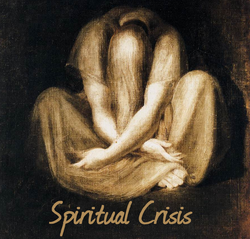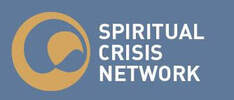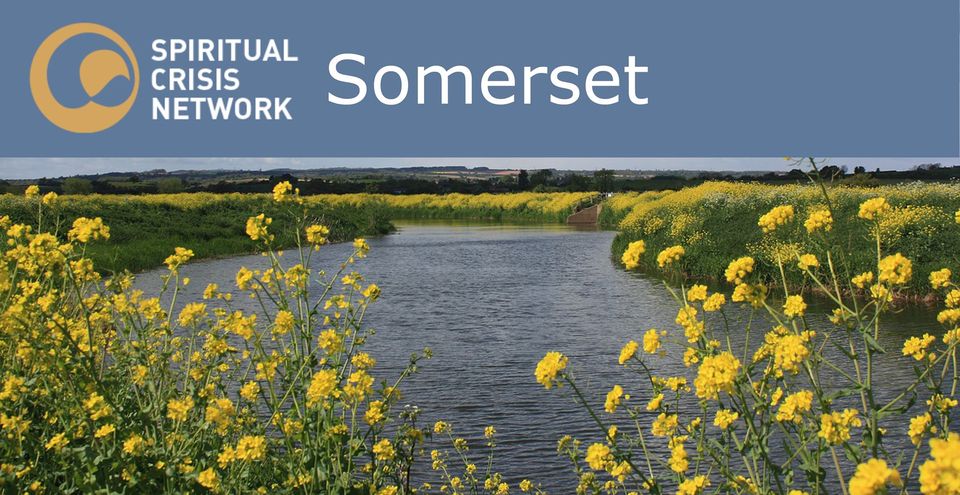 'Silence' by Johann Heinrich Fussli
'Silence' by Johann Heinrich Fussli
(Also known as Spiritual Emergence, Spiritual Emergency, Dark Night of the Soul, The Ordeal, The Testing, Spiritual Madness, psycho-spiritual crisis.
"It is possible to undergo a profound crisis involving non-ordinary experiences and to perceive it as pathological or psychiatric when in fact it may be more accurately and beneficially defined as a spiritual emergency".
Stanislav Grof
It's well known that on a spiritual journey, whether physical or metaphorical, that a pilgrim may encounter 'perils and pitfalls'. In Jerusalem they have coined the phrase 'The Jerusalem Effect' to describe the malaise experienced by some of their pilgrim visitors and the Glastonbury community has noticed its own version of this, calling it 'A Glastonbury Experience'. One of the stages in the experience is known as ‘spiritual crisis’ and can be described as a turbulent period of deep spiritual opening and transformation and during this time, we come to question the world around us, our own selves and our beliefs.
This small town probably has more people per square mile who have some understanding of spiritual crisis and the process of transformation than any other place in England. This process follows a pattern that is seen in many beliefs and is not unique to any one faith or path and it is important to remember that the pattern that occurs here is not specific to Glastonbury and can happen to any individual at any time and in any place. However, there are a couple of differences in Glastonbury in that so many people are drawn to come and live here without any awareness of ‘a process’ and that once here, the energies of the place seem to enhance, reinforce and magnify our experiences.
Undergoing a spiritual crisis may cause an individual to find they are experiencing significant disruption in psychological, social and occupational functioning and in such a crisis, the person is barraged with many inner changes. Their old beliefs and behaviours are challenged as their relationship with reality rapidly shifts. They suddenly do not feel comfortable in the once familiar world and may have problems meeting the demands of daily life. They may find it difficult to distinguish between their inner visionary world and the external world of everyday reality. Within their bodies they may feel forceful energies causing uncontrollable tremors (Grof & Grof, 1986, Spiritual emergency: The understanding and treatment of transpersonal crises p. 35).
Among the spiritual experiences thought to lead to episodes of spiritual crisis are:
Although these are not necessarily symptoms of a spiritual crisis, they can be disturbing and frightening if you haven't experienced them before or if they become very intense. You might feel like you are going crazy and it may be very hard to 'trust the process'. You can also start to feel that the experiences are out of control, invasive or frightening.
Why do some of us experience 'spiritual crisis' and others don't?
Here are some possible reasons and some preventative measures.
Early childhood trauma or indeed shock and trauma of any kind. If we think of the body as a house that needs to have solid foundations in order to support the upper floors, we can see how cracks in those foundations will have an effect. Spiritual practice can be problematic when used to 'by-pass' or 'rise above' our wounding. Being in psychotherapy, or working with the body in some way, e.g craniosacral therapy may be helpful.
Lack of context
Most spiritual paths encourage people to practise within a community of like minded people or to have a guide, spiritual teacher, guru or mentor. In these modern days, many of us will try a mix of practices without seeing them in the context of lineage or community. Even if you find groups difficult and don't accept that you need a guide, see if you can find some way of connecting to a sense of all the people who have trod the path before you - the roots - and all the people who are currently on the journey with you.
Lack of grounding
There is a Sufi saying: 'Trust in God but tie up your camel'. Most spiritual paths have their version of stories that extol the virtues of 'doing the ordinary'. Cooking, eating warming grounding foods, gardening, walking barefoot on the earth, being in nature, even paying the bills or cleaning the house - these are all examples of simple practices that can help us stay grounded on the spiritual path.
Spiritual Crisis First-Aid
Don't forget. . .
There is a difference between a spiritual crisis and a true psychotic break. People who are in spiritual crisis are still very lucid and have a sense of their own inner processes. Typically, they realise that the changes in their experiential world are due to the changes they are experiencing within and are not the cause of external events. The person afflicted by a true psychosis lacks the insight that the condition has something to do with own psyche (Grof & Grof, 1990, The Stormy Search for the Self. pp. 43-44).
If understood, and where necessary supported appropriately, a spiritual crisis can be deeply transformative, offering the possibility of breakthrough rather than breakdown.
This small town probably has more people per square mile who have some understanding of spiritual crisis and the process of transformation than any other place in England. This process follows a pattern that is seen in many beliefs and is not unique to any one faith or path and it is important to remember that the pattern that occurs here is not specific to Glastonbury and can happen to any individual at any time and in any place. However, there are a couple of differences in Glastonbury in that so many people are drawn to come and live here without any awareness of ‘a process’ and that once here, the energies of the place seem to enhance, reinforce and magnify our experiences.
Undergoing a spiritual crisis may cause an individual to find they are experiencing significant disruption in psychological, social and occupational functioning and in such a crisis, the person is barraged with many inner changes. Their old beliefs and behaviours are challenged as their relationship with reality rapidly shifts. They suddenly do not feel comfortable in the once familiar world and may have problems meeting the demands of daily life. They may find it difficult to distinguish between their inner visionary world and the external world of everyday reality. Within their bodies they may feel forceful energies causing uncontrollable tremors (Grof & Grof, 1986, Spiritual emergency: The understanding and treatment of transpersonal crises p. 35).
Among the spiritual experiences thought to lead to episodes of spiritual crisis are:
- Intense spiritual practice such as a retreat and/or chanting/meditating for long periods
- Participating in intensive work-shops/group-work
- Religious ecstasy
- A psychic opening
- A personal life crisis such as bereavement or the end of a relationship, financial hardship, a series of failures,
- Powerful earth energies as can be found in Glastonbury
- Combining drug use with spiritual practice
- Sexual experience
- Experiencing a roller-coaster of feelings from profound experiences of oneness, bliss and love to intense painful feelings of alienation, separation and sometimes deep hatred, paranoia or fear.
- Physical symptoms such as rushes of energy, heat, spontaneous movements, feeling 'spaced out', forgetting to eat, insomnia.
- Perceptual changes - seeing visions, ghosts, angels, u.f.o's, auras etc.
- Hearing voices, receiving 'guidance', becoming extremely sensitive to noise, finding other voices speaking through you, speaking 'in tongues' etc.
Although these are not necessarily symptoms of a spiritual crisis, they can be disturbing and frightening if you haven't experienced them before or if they become very intense. You might feel like you are going crazy and it may be very hard to 'trust the process'. You can also start to feel that the experiences are out of control, invasive or frightening.
Why do some of us experience 'spiritual crisis' and others don't?
Here are some possible reasons and some preventative measures.
Early childhood trauma or indeed shock and trauma of any kind. If we think of the body as a house that needs to have solid foundations in order to support the upper floors, we can see how cracks in those foundations will have an effect. Spiritual practice can be problematic when used to 'by-pass' or 'rise above' our wounding. Being in psychotherapy, or working with the body in some way, e.g craniosacral therapy may be helpful.
Lack of context
Most spiritual paths encourage people to practise within a community of like minded people or to have a guide, spiritual teacher, guru or mentor. In these modern days, many of us will try a mix of practices without seeing them in the context of lineage or community. Even if you find groups difficult and don't accept that you need a guide, see if you can find some way of connecting to a sense of all the people who have trod the path before you - the roots - and all the people who are currently on the journey with you.
Lack of grounding
There is a Sufi saying: 'Trust in God but tie up your camel'. Most spiritual paths have their version of stories that extol the virtues of 'doing the ordinary'. Cooking, eating warming grounding foods, gardening, walking barefoot on the earth, being in nature, even paying the bills or cleaning the house - these are all examples of simple practices that can help us stay grounded on the spiritual path.
Spiritual Crisis First-Aid
- It is usually thought to be a good idea to temporarily stop doing any spiritual practices such as meditation or chanting and participation in rituals/ceremonies.
- Undertake daily grounding activities such as those outlined above.
- Some people find vigorous exercise very helpful because of the amount of energy they are experiencing in their bodies. Others find gentle strolling, Tai Chi, Qigong or yoga to be helpful.
- Many people have found this to be a time where their creative energies become powerful and these can be used as a way of expressing their experience, releasing emotion and grounding and focusing.
- Talk to trusted friends. One of the most helpful things can be to find someone to talk to about your experience who has been through something similar and come out the other side.
- For complementary practitioners such as homoeopaths, acupuncturists or counsellors & psychotherapists etc. look at our therapist listings.
- Don't rule out the possibility that you may need professional help of some kind.
- People experiencing extreme states can sometimes benefit from medication or even hospitalisation.
Don't forget. . .
There is a difference between a spiritual crisis and a true psychotic break. People who are in spiritual crisis are still very lucid and have a sense of their own inner processes. Typically, they realise that the changes in their experiential world are due to the changes they are experiencing within and are not the cause of external events. The person afflicted by a true psychosis lacks the insight that the condition has something to do with own psyche (Grof & Grof, 1990, The Stormy Search for the Self. pp. 43-44).
If understood, and where necessary supported appropriately, a spiritual crisis can be deeply transformative, offering the possibility of breakthrough rather than breakdown.

The Spiritual Crisis Network, (SCN) is a UK non-profit organisation that provides support and resources to help make meaning of and integrate a crisis experience, resulting in the relief of suffering and more positive outcomes.
Working with the SCN, we have formed the Glastonbury and Somerset Spiritual Crisis Support Group.
Find us on Facebook.
RESOURCES can be found on the national page
Spiritual Crisis Network
Working with the SCN, we have formed the Glastonbury and Somerset Spiritual Crisis Support Group.
Find us on Facebook.
RESOURCES can be found on the national page
Spiritual Crisis Network

